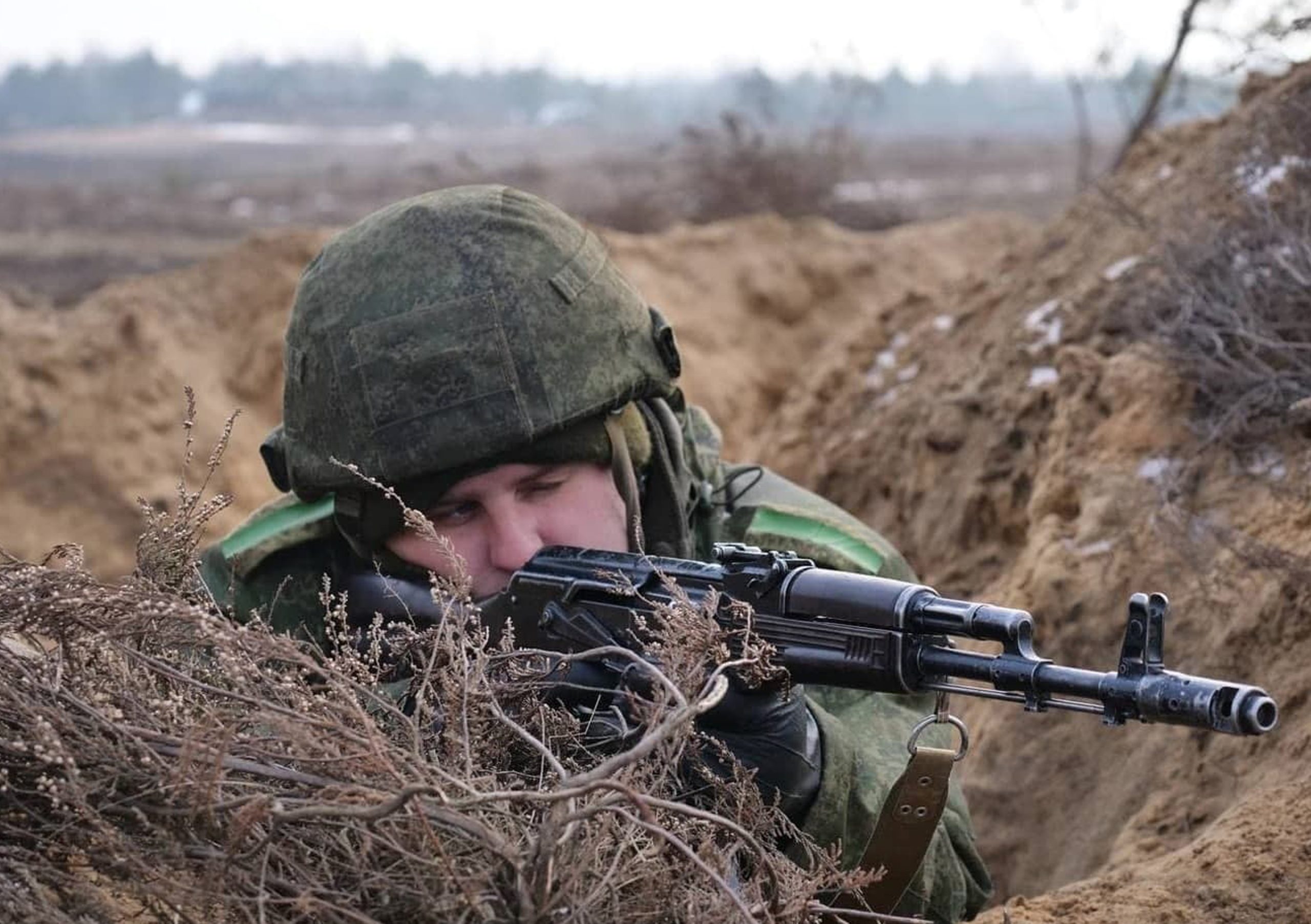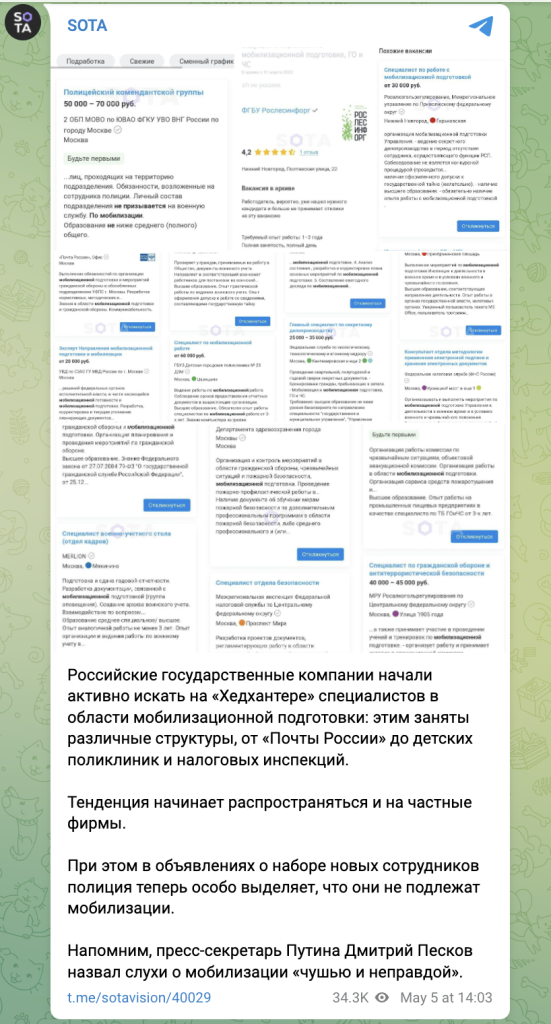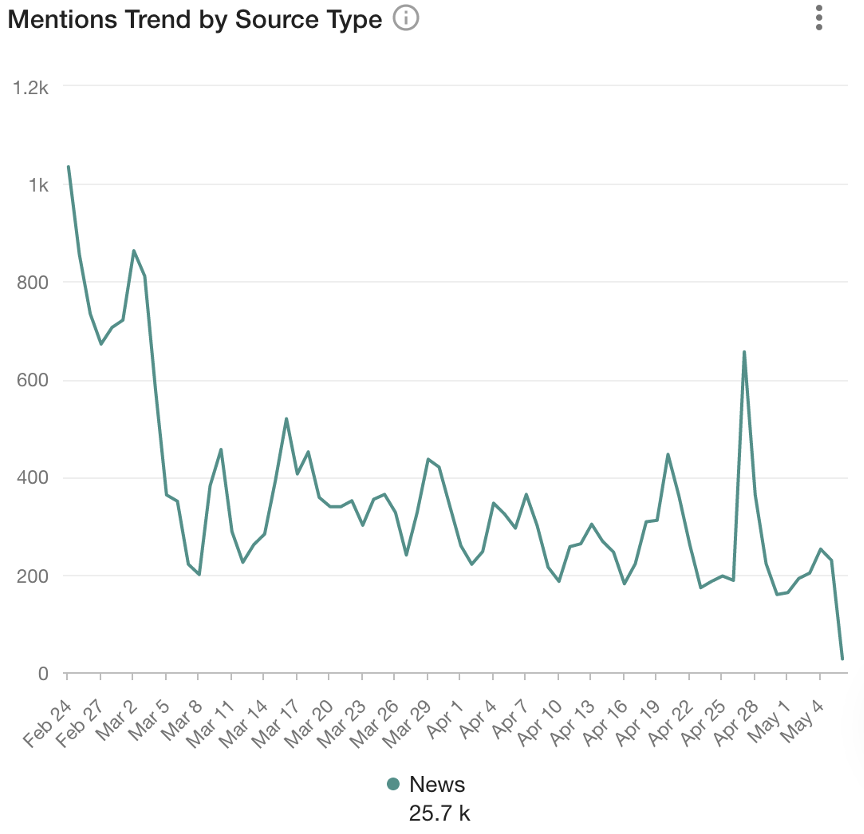Russian War Report: Belarus launches “combat preparedness test”
The Belarusian military began unannounced combat drills, the Kremlin drops the term “denazification,” and a Latin American RT influencer resigns.
Russian War Report: Belarus launches “combat preparedness test”
Share this story

As Russia continues its assault on Ukraine, the Atlantic Council’s Digital Forensic Research Lab (DFRLab) is keeping a close eye on Russia’s movements across the military, cyber, and information domains. With more than seven years of experience monitoring the situation in Ukraine, as well as Russia’s use of propaganda and disinformation to undermine the United States, NATO, and the European Union, the DFRLab’s global team presents the latest installment of the Russian War Report.
Security
Tracking Narratives
Media Policy
Belarus launches “combat preparedness test”
On May 4, the Belarusian military started unannounced combat drills. The Belarusian opposition reported on the “sudden combat preparedness test,” which is outside the usual cycle of Belarusian military exercises. A similar exercise was conducted in May 2021, when numerous Belarusian military units were put on high alert as well. The current unannounced exercise is likely a response to Defender Europe 2022, a large-scale military exercise conducted by the US and nineteen European countries over the course of May, as well as NATO exercises in Georgia, Latvia, Lithuania, North Macedonia, and Norway.
The day after the start of the Belarusian combat drills, videos started surfacing showing Belarusian forces on the move. These videos documented large military formations allegedly moving towards its borders with Poland, Latvia, and Lithuania. A British intelligence report suggested that Russia may use the military exercise in Belarus to deter Ukrainian forces. Although the report did not observe any specific threat from in the exercise, Russia will “likely seek to inflate the threat posed to Ukraine” by the training, it said.
—Lukas Andriukaitis, Associate Director, Brussels, Belgium
Continuous Russian attacks pound Azovstal
The Ukrainian garrison at the Azovstal steel plant in Mariupol continues to hold its ground despite relentless Russian bombardment. New footage of the factory being shelled surfaced on May 6, showing Russian artillery attacks from multiple angles. That same day, Ukrainian presidential adviser Andriy Yermak announced that another five hundred civilians were evacuated from Mariupol.
On May 5, photos surfaced showing workers changing street signs in Mariupol from Ukrainian into Russian. Meanwhile, a video that surfaced on May 4 showed that there are still Ukrainian troops inside the factory with combat capabilities. However, a video appeal from a military medic in Azovstal reported on a dire situation of people dying of diseases, due to the lack of antibiotics and other medicine. The medic, a Crimean Tatar of Turkic Giray descent, directed his appeal at Turkey.
—Lukas Andriukaitis, Associate Director, Brussels, Belgium
Russia promotes Ukrainian grandmother with Soviet flag, while she says that they distorted her motives
In early April, a video of a grandmother greeting Ukrainian soldiers with the Soviet flag surfaced on the web. She had apparently thought that they were Russian soldiers, and greeted them with the Soviet flag. When the soldiers gave her food but stomped on the flag, however, she refused to take the food, claiming that her parents had fought for that flag. The grandmother became a prominent figure for Russian propagandists, who started erecting sculptures, and commissioning murals and banners.
On May 5, the Ukrainian Center for Strategic Communications found her and conducted an interview. After Russians shelled her yard, Ukrainian soldiers evacuated her and her husband to a nearby city. “Things are lousy, of course, since Russia went so evil on us, it’s very lousy,” she said, adding, “I did not think they would be bombing us this way.” While asked about her recent prominence in Russia, she replied, “It would’ve been better if I had not become famous and there was no war.” She also thought that she could “placate” Russians, she said, which is why she greeted the soldiers with the Soviet flag, hoping it could help avoid additional shelling and nudge them to resolve issues diplomatically. Russian propaganda tried to twist the interview by groundlessly claiming that Ukraine bombed her house and pressured her into these statements.
—Roman Osadchuk, Research Associate
Russia denies mobilization plans as state agencies search for “mobilization experts”
Amid Kremlin denials of planning to declare a full-scale mobilization in Russia, several Russian state agencies have started opening vacancies for “mobilization experts.” The job listings, which have appeared in Russian online job portals, were placed by various Russian state agencies, including the Russian Postal Service, the Federal Tax Service, the Ministry of Internal Affairs, and the Federal Service for Alcohol Market Regulation.
Kevin Rothrock, managing editor of Meduza, tweeted the screengrabs initially shared by the SOTA Telegram channel, which identifies itself as Russian news platform.

The DFRLab verified the job listings and found that they have mostly appeared on the Russian online job portal nn.hh.ru. Some vacancies state in their titles that they are searching for mobilization experts and civil defense specialists. Other vacancies, such as a consultant on electronic signatures and electronic document storage, indicate in their job description that a person should be capable of “organizing and carrying out activities for the preparation of mobilization” in wartime or a state of emergency.
Some of these vacancies were placed on April 29, while the latest ones were announced on May 4 and May 5. All of the listings include a requirement that candidates must be able to carry out mobilization activities.
—Eto Buziashvili, Research Associate, Washington, DC
Kremlin drops the use of term “denazification” as many Russians did not understand it
Proekt, an independent investigate journalism outlet in Russia, learned from four sources close to Kremlin propaganda planning, that regular Russians did not understand the term “denazification,” which has been used by Vladimir Putin to justify his full-scale invasion into Ukraine. This conclusion was made after telephone surveys showed respondents having difficulties explaining the term. Proekt also cited the example of Kremlin propagandist Dmitry Kiselov attempting to explain the term during his TV show on February 27 and March 6, then later dropping the term altogether.
The DFRLab confirmed a decrease in use of the keyword “denazification” by Russian media outlets soon after the start of the invasion of February 24, using online content analysis tool Meltwater. The decrease began in the beginning of March, around the same time the telephone surveying reportedly took place. The graph below displays usage of the term over time by Kremlin-owned media, pro-Kremlin media, and independent Russian outlets.

—Nika Aleksejeva, Lead Researcher, Riga, Latvia
Pro-Kremlin influencer in Latin America resigns from RT but sticks to old narratives
On May 3, Inna Afinogenova, a Russian journalist previously associated with RT en Español and the RT-affiliated channel Ahí Les Va! (“There it goes!”), published a video on her personal YouTube account in which she explained that she has left RT and would no longer appear in Ahí Les Va! videos.
According to Afinogenova, “I do not agree with this war…. Who can agree with a war? Just a few, [but] I am not among them….I have never agreed with any war because I know – and I know it from having suffered it myself – how these actions affect civilians above all.”
Despite Afinogenova’s disagreement over Russia’s invasion of Ukraine, she continued to push anti-NATO and anti-EU narratives that she previously highlighted as an RT journalist. She cited “NATO’s aggressiveness” and “Ukrainian ultranationalists,” as well as narratives around Ukraine receiving weapons from other countries. Her latest remarks reflected similar statements from a March 1 video she made for Ahí Les Va!.
At the time of writing, her latest video has reached more than 135,000 views. Afinogenova’s YouTube channel, which she created the day before posting the video, has amassed more than 28,000 subscribers. The video has garnered more than 4,500 interactions on Facebook and around 15,000 interactions on Twitter.

—Esteban Ponce de León, Research Associate, Bogota, Colombia
Yandex News aggregator whitelisting Kremlin-approved outlets
Yandex, the equivalent of Google for the Russian online market, has been whitelisting fifteen Kremlin-approved media outlets in Russia to display their news most prominently, according to an investigation by Meduza. The known outlets are: Izvestiya, RIA Novosti, TASS, Interfax, Rosiyskaya Gazeta, Kommersant, Vedomosti, RBK, Gazeta.ru, RT, Lenta, Regnum, Nezavisimaya Gazeta, and Vzglyad. The DFRLab has routinely spotted these outlets spreading Kremlin propaganda and disinformation on a regular basis.
Meduza journalist Svetlana Reyter talked with current and former Yandex employees, who told her that the list was created in 2015 by order of Russia’s office of the president, then activated in 2016 when Russia passed a law regulating the activity of online news aggregators.
Following Russia’s February 2022 invastion of Ukraine, Lev Gershenzon, the former head of Yandex News, called on his former colleagues to stop promoting propaganda outlets. This reportedly started a discussion in Yandex that resulted in a decision to sell Yandex News and Yandex Dzen, the company’s blogging platform. The decision to sell both products went public in mid-March. By the end of April, it became known that VKontakte (VK), Russia’s largest social network, is buying both products. VK is under direct influence of the Kremlin. The head of VK, Vladimir Kirienko, is also the son of Sergey Kirienko, first deputy chief of staff to the office of President Putin.
On April 26, Meduza cited multiple anonymous sources from Yandex saying that the company is planning to split into two parts. One part will continue working within the Russian market, while other will focus internationally. Yandex’s PR department has denied the claim.
—Nika Aleksejeva, Lead Researcher, Riga, Latvia

